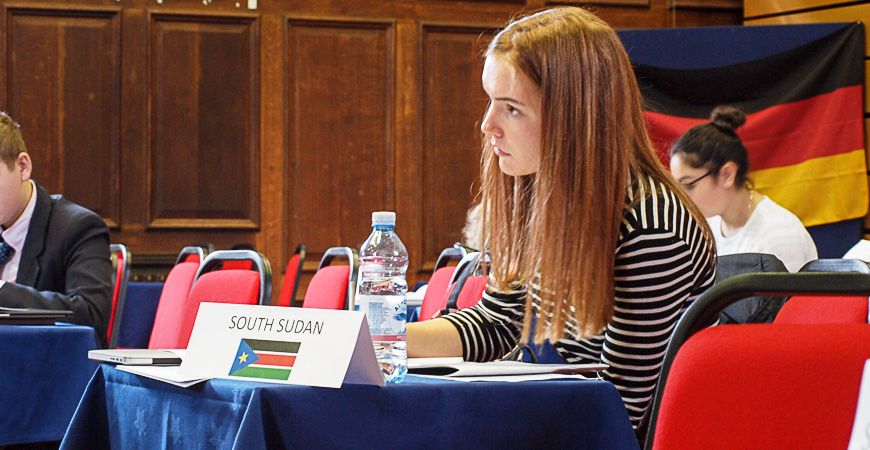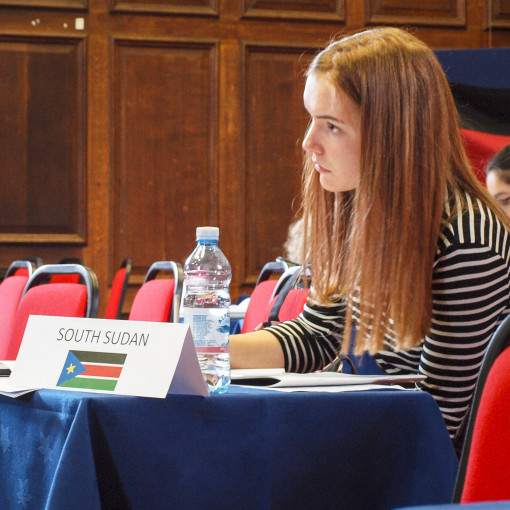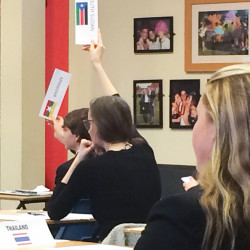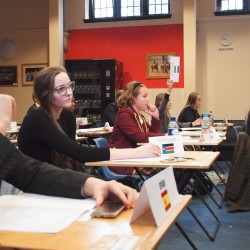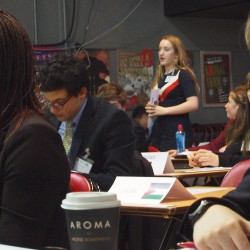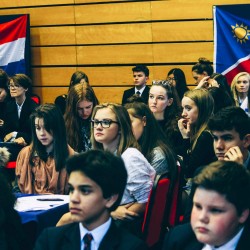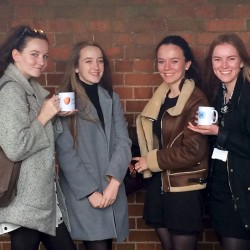Article Date: 06 March 2017
Article Date: 06 March 2017
Model United Nations (MUN) conferences aim to replicate the discussions and debates of UN committees, by involving students representing the views of different countries on a wide range of issues, and giving students the opportunity to research, present and argue a case in support of their allocated country's positio
Universities value participation in MUN highly because of the opportunities it provides to develop intercultural understanding, analytical thinking, negotiation and presentation skills and self-confidence, amongst other skills. Conferences involve a mixture of formal debate in both speech and writing, navigating the complex UN rules for procedure, informal lobbying and technical writing, while maintaining a role as the voice of a country whose beliefs and values do not necessarily reflect your own.
It was a privilege to accompany four Braintree Sixth Form students to our first experience of a Model United Nations conference on 26 and 27 February this year. At Felsted School, we joined delegations from another 19 schools from across the region, country and even elsewhere in Europe. About 60 countries were represented by a delegation in total, including at one point the newly created 'Republic of California', which in a final emergency debate had to defend its position in an imagined crisis following the assassination of Donald Trump and Mike Pence and a descent into political chaos for the USA. Verity Forster, Leah Roby Smith, Natacha Maurin and Lily Richards represented Braintree Sixth Form at the conference and were given the considerable challenge of representing South Sudan, the world's newest country. This was particularly daunting, given a current humanitarian crisis in the country, with fears of both famine and genocide very much in the news at the moment, the blame for which has been laid by many at the South Sudanese government's door. South Sudan also has a poor record on human rights, including LGBTQ rights, and as this was a theme of the conference, representing the South Sudanese perspective was particularly challenging.
However, once the conference started students were in their element. They contributed to debates, submitted amendments to resolutions, lobbied hard, formed alliances with other nations and both supported and challenged others. They enjoyed the written debates very much and, unlike North Korea, did not get banned from messaging for sending threats! This was our first conference and looking at Twitter afterwards, this appears to be a 'thing', so I would like to congratulate Leah, Lily, Natacha and Verity for their excellent contributions to the event - we were not sure in advance of what to expect from the experience, but it is safe to say that over the days of the conference confidence grew enormously, and the experience was engaging and fascinating for students at every level. We are now MUN addicts and will be looking to repeat the experience.
I spoke about the MUN to students in Years 7 - 11 this half term in an assembly about tolerance and mutual respect. The MUN is a fine example of the ways we can develop these values and I would urge any Year 11 students who are joining Year 12 next year to consider participating.
Mrs M Townsend
Assistant Headteacher – KS4
Model United Nations
On 25 and 26 February, Felsted school hosted their annual Model United Nations conference where a team of four students from Braintree Sixth Form represented South Sudan. The team included Verity Forster, Natacha Maurin, Lily Richards and Leah Roby Smith.At first we were apprehensive; we had little knowledge of how MUN worked and it was our first time surrounded by people who had very obviously done this many times before. We arrived with all the research we had done over the last couple of weeks and soon discovered that there were also international schools attending, such as the team of delegates representing the UK who were from Transylvania. It was great to be able to socialise with students from other countries who all share an interest in current world affairs. Throughout the conference we made friends from teams all over and we were spurred on by the enthusiasm of everybody around us. Our nerves soon went away once we got the hang of things, with a little help from the pros, and were soon all participating.
Model United Nations is a replication of real UN conferences but is carried out by students representing any of the 193 countries. Each school team were allocated one country (although a school can have more than one team) and we represented South Sudan. Each country is separated into different committees which are Economic and social, Health care, Security council, Ecology and environment and finally Human rights. Before the conference, each team has to research the topics given under your committee to ensure that you can bring a good argument to a proposed resolution. Resolutions are ideas put forward by countries on how to resolve certain issues; for example a theme of the Felsted conference was LGBT rights and therefore we had to research South Sudan’s policies (in this case they are strongly against any form of homosexual activity). You are then able to argue your point either by a spoken or written debate, in which notes are sent to other countries either to gain alliances or seek support. You are also allowed to make amendments to the resolution by sending a note to the country proposing the resolution, who then decide whether to put the amendment through. It is a great way to meet new people who have similar interest and it also it is a great way to boost your confidence and public speaking skills.
The conference lasted two days and each day held a new experience for us all. On the first day we received an inspiring speech on LGBT rights by a speaker from Outhouse, a charity based in Colchester, Essex. After receiving this speech there was a short welcome to the competition given by one of the teachers at Felsted and we were then split off into our separate committees. This was an extremely nerve-wracking experience as we headed off by ourselves; however we all quickly settled into the activities. At first we all felt extremely apprehensive about speaking due to the fact that everyone had adopted a strange way of talking which meant referring to yourself in the third person as a “delegate” and addressing people as “fellow delegates” or “honourable chairs” depending on their role. Once we surpassed this strange use of terminology we each got into the swing of things.
During recesses all delegates got the opportunity to speak to other delegates; our Health delegate found a girl that had participated in more than 20 MUN’s! Each of us had the chance to debate passionately from the viewpoint of South Sudan, and then all the committees broke for lunch and we exchanged our battlefield stories with each other. The four of us then returned to our own committees for our final resolution of the day, and when this was over, headed to the canteen for lots of international food snacks. After having filled 2 plates [at least – Ed] full of chicken nuggets, we decided to make our way back home and prepare for the next day.
The second day started off much like the first in that we received a speech from a very inspiring charity CEO Dr Elly Barnes who explained everything to us about the correct words to use when addressing LGBT+ people, which ended in a sing song about a penguin named Tango who was adopted by two homosexual penguins in New York zoo. We then split off into joint committees and finally got to help each other out. This made us even more confident and some of us spoke to the “fellow delegates” and “honourable chairs” at the front of the conference. For us this was a massive achievement as at the start of the experience none of us would have seen ourselves growing this fast in confidence!
After this we came back into a general assembly. This meant all committees from every country were debating a resolution together. It was very intimidating as there were so many people to speak in front of, however after a funny interval from the delegate of DPRK we all felt a bit more confident and not as afraid to mess up. At the end of the general assembly an emergency announcement was made letting us know that California had seceded from the USA and had become the republic of California. Donald Trump and Mike Pence had been assassinated leaving Alaska to be invaded by Russia and the Southern States being taken over by Mexico.
Immediately after this shocking announcement we were told lunch was to be used for writing resolutions and lobbying. During this intense lobbying where we also consumed a lot of apple pie and custard, we were persuaded by the charismatic delegate of Ethiopia to join them in a resolution that would mean African countries would help the war effort if they could bid on running certain states within the US afterwards. The final debate was a heated one as many countries disagreed with the resolutions. Many people were given the opportunity to speak and notes flew around the room. Unfortunately this debate ended in the slightly ludicrous resolution not being passed. We finished the day with closing speeches and awards for delegations; unfortunately we did not receive any but we are aiming high next time! The conference was brought to a bittersweet end as we all went our separate ways back to school.
Each of us felt incredibly nervous at the beginning of this experience due to the fact we were unsure of what to expect and initially felt intimidated by the masses of incredibly intelligent people that attended the conference. But soon, it became apparent to us that there were others who felt the same way, and as we each grew in confidence, we started putting South Sudan’s view across, making alliances and being able to experience the conference fully and not just taking a back seat. It was very rewarding for us to attend this conference, not only to gain confidence but also many of us are now considering careers in politics or the United Nations. We would like to also announce that we are hoping to set a MUN club in the lower school very soon.
We would like to thank Mrs.Townsend for giving us this great opportunity and for supporting us throughout the conference. Here’s to many more conferences to come!
Written by: Verity Forster, Natacha Maurin, Lily Richards and Leah Roby Smith.

